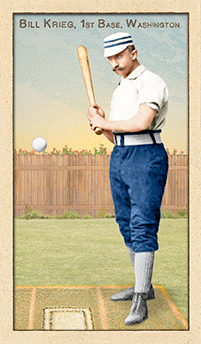- Card series: Beginnings: 1880's
- City: Washington, D.C.
- Team: Nationals
- League: National League
William Frederick Krieg (1859-1930) was a powerhouse in the minors, but barely left an impression in the big leagues. Coming out of Notre Dame, Krieg joined the Northwestern League’s Springfield and Peoria teams in 1883. The following season he got a chance at the big time as the Union Association multiplied opportunities for young pro players. He signed on with the bi-city Chicago/Pittsburgh entry as their catcher, playing in 71 games with a .247 average. Over the next three seasons, Bill would roam among three other major league clubs and various minor league teams. His stints in the American Association and National League were brief and his output paltry.
When he finally resigned himself to play in the minors permanently, Krieg came into his own. In 1887 with the Minneapolis Millers he batted .402, second in the Northwestern League. He then became a terror in the Western Association, hitting .324 with St. Joseph in ’89 and .339 with Milwaukee in ‘92, good for his first batting title. His second title was historically good, when he ravaged WA pitchers for an astounding .452 performance with the Rockford Forest Citys in 1895. He was the team’s slugger, tallying 15 triples and 12 home runs.
While Krieg’s time in the majors was brief, he showed remarkable durability in the game. He finally retired as a player in 1901 at age 42, but served one more season as manager for the Southern League Chattanooga squad. Bill even returned for one last hurrah as manager of Muscatine of the Central Association in 1912.
- Across all his minor league stints, Krieg batted .335 lifetime
- Bill James ranks Krieg as the best minor league player of the 1880s
-
Bill’s uniform color on this card was changed in March, 2017 from black to blue to reflect recent reliable research by Craig Brown & friends at Threads of Our Game. One card had been previously released featuring a black uniform.
